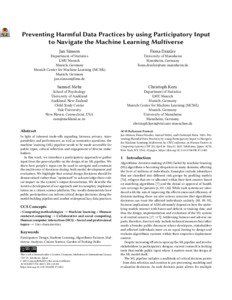|
Preventing harmful data practices by using participatory input to navigate the machine learning multiverse
Simson, Jan
;
Draxler, Fiona
;
Mehr, Samuel
;
Kern, Christoph
![[img]](https://madoc.bib.uni-mannheim.de/69802/1.hassmallThumbnailVersion/3706598.3713482.pdf)  Vorschau |
|
PDF
3706598.3713482.pdf
- Veröffentlichte Version
Download (1MB)
|
|
DOI:
|
https://doi.org/10.1145/3706598.3713482
|
|
URL:
|
https://dl.acm.org/doi/10.1145/3706598.3713482
|
|
URN:
|
urn:nbn:de:bsz:180-madoc-698022
|
|
Dokumenttyp:
|
Konferenzveröffentlichung
|
|
Erscheinungsjahr:
|
2025
|
|
Buchtitel:
|
Proceedings of the 2025 CHI Conference on Human Factors in Computing Systems
|
|
Band/Volume:
|
Article 806
|
|
Seitenbereich:
|
1-30
|
|
Veranstaltungstitel:
|
CHI 2025, Conference on Human Factors in Computing Systems
|
|
Veranstaltungsort:
|
Yokohama, Japan
|
|
Veranstaltungsdatum:
|
26.04.-01.05.2025
|
|
Herausgeber:
|
Yamashita, Naomi
;
Evers, Vanessa
;
Yatani, Koji
;
Ding, Xianghua (Sharon)
;
Lee, Bongshin
;
Chetty, Marshini
;
Toups-Dugas, Phoebe
|
|
Ort der Veröffentlichung:
|
New York, NY, USA
|
|
Verlag:
|
Association for Computing Machinery
|
|
ISBN:
|
979-8-4007-1394-1
|
|
Sprache der Veröffentlichung:
|
Englisch
|
|
Einrichtung:
|
Außerfakultäre Einrichtungen > MZES - Arbeitsbereich A
|
|
Bereits vorhandene Lizenz:
|
 Creative Commons Namensnennung 4.0 International (CC BY 4.0) Creative Commons Namensnennung 4.0 International (CC BY 4.0)
|
|
Fachgebiet:
|
004 Informatik
|
|
Freie Schlagwörter (Englisch):
|
participatory design , machine learning , algorithmic fairness , multiverse analysis, citizen science , garden of forking paths
|
|
Abstract:
|
In light of inherent trade-offs regarding fairness, privacy, interpretability and performance, as well as normative questions, the machine learning (ML) pipeline needs to be made accessible for public input, critical reflection and engagement of diverse stakeholders.In this work, we introduce a participatory approach to gather input from the general public on the design of an ML pipeline. We show how people’s input can be used to navigate and constrain the multiverse of decisions during both model development and evaluation. We highlight that central design decisions should be democratized rather than “optimized” to acknowledge their critical impact on the system’s output downstream. We describe the iterative development of our approach and its exemplary implementation on a citizen science platform. Our results demonstrate how public participation can inform critical design decisions along the model-building pipeline and combat widespread lazy data practices.
|
 | Dieser Eintrag ist Teil der Universitätsbibliographie. |
 | Das Dokument wird vom Publikationsserver der Universitätsbibliothek Mannheim bereitgestellt. |
 Suche Autoren in Suche Autoren in
BASE:
Simson, Jan
;
Draxler, Fiona
;
Mehr, Samuel
;
Kern, Christoph
Google Scholar:
Simson, Jan
;
Draxler, Fiona
;
Mehr, Samuel
;
Kern, Christoph
ORCID:
Simson, Jan  ORCID: 0000-0002-9406-7761 ORCID: 0000-0002-9406-7761 ; Draxler, Fiona ; Mehr, Samuel ; Kern, Christoph  ORCID: 0000-0001-7363-4299 ORCID: 0000-0001-7363-4299
Sie haben einen Fehler gefunden? Teilen Sie uns Ihren Korrekturwunsch bitte hier mit: E-Mail
Actions (login required)
 |
Eintrag anzeigen |
|
 ORCID: 0000-0002-9406-7761 ; Draxler, Fiona ; Mehr, Samuel ; Kern, Christoph
ORCID: 0000-0002-9406-7761 ; Draxler, Fiona ; Mehr, Samuel ; Kern, Christoph  ORCID: 0000-0001-7363-4299
ORCID: 0000-0001-7363-4299



 Creative Commons Namensnennung 4.0 International (CC BY 4.0)
Creative Commons Namensnennung 4.0 International (CC BY 4.0) Suche Autoren in
Suche Autoren in